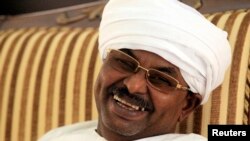Sudan's public prosecutors have called for the dismissal of the director of the National Intelligence and Security Service after agents prevented police from arresting former security chief Salah Abdallah, known as Salah Gosh.
The case has raised questions about whether certain people are above the law in Sudan and has caused alarm among protesters and analysts.
Gosh was the head of the National Intelligence and Security Service until he resigned in April, days after the military ousted longtime President Omar al-Bashir.
The prosecutor's office said Gosh was to be questioned about an account containing more than $1 million (46 million Sudanese pounds), which was only accessible by him. But his guards blocked his arrest Tuesday, saying they did not receive an arrest warrant in advance.
Political analyst Alfatih Mahmoud said arresting Gosh was important for protesters, as he was responsible for repressing demonstrators and has all of the Bashir regime's corruption files.
Bashir is already facing charges of incitement and involvement in the killing of protesters.
The Sudanese protests erupted in December over bread prices but quickly morphed into calls for Bashir to step down after 30 years in power. Dozens were killed during a failed government crackdown and more have died in recent weeks in clashes with security forces.
Protesters continue to hold a sit-in outside military headquarters in Khartoum.
One of the demonstrators, Mohamed Omer, expressed his frustration about the failed attempt to arrest Gosh.
In Omer’s opinion, when the rank is higher, the power is greater. He said it was difficult to determine which soldier fired, but there's no question about which agency issued the orders. Omer feels it's a top priority to arrest Gosh to sustain the prestige of law.
Meanwhile, the lead protest group, the Sudan Professionals Association, continues to negotiate with army leaders over who will control a proposed joint civilian and military transitional government. The SPA called for a million-person march on Thursday and threatened a nationwide strike if the military does not yield power.





